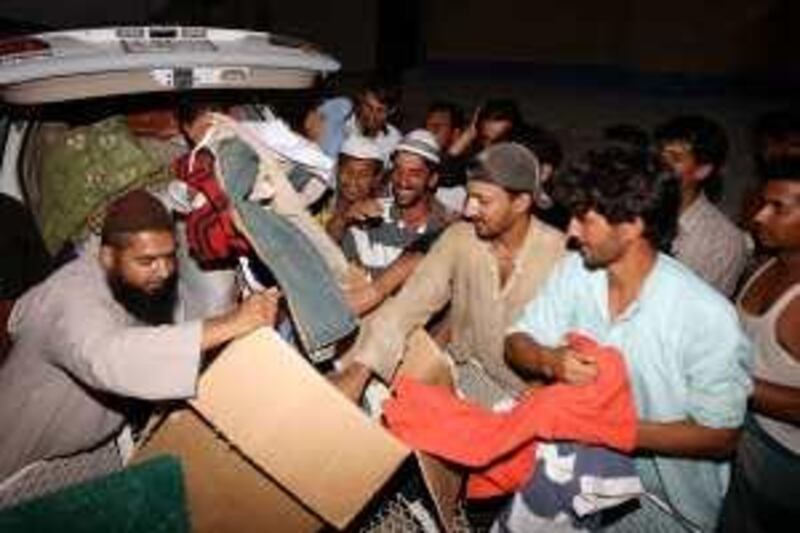It is 7pm and a group of labourers is forming at the entrance of Ajman Labour Camp in Humaidiya as a 4x4 pulls up and unloads several boxes. As the boxes are opened, the labourers fall on them, grabbing whatever they can find, which this time is a selection of clothes, crockery and toiletries donated mainly by people leaving the country.
"It's small stuff, just a cup or a plate, but they cannot afford even these small things and they need them desperately," said Faisal Khan, who is behind the website takemyjunkuae.com, which encourages residents to give furniture or household goods they no longer need and would otherwise throw away. Rizwan Ashfaq, a Pakistani labourer, said he had gone for a pair of trousers because his monthly salary of Dh1,200 (US$325) did not leave him enough money to buy clothes.
"I don't know if this trouser would be long enough for me," he said, holding up the pair he had secured. "I wish I could get a shirt as well but I missed out on a lot this time." Attallah Hassan Khan managed to get a flask and a blanket and said he would send the flask back to Pakistan for his family. "I will send it back so my wife can have a flask for the late-night Ramadan meals," he said. "My daughter will also be happy to have tea from the flask every morning before going to school."
Faisal Khan, 34, felt moved to help labourers after watching the BBC documentary Slumdogs and Millionaires, which was critical of living conditions in labour camps. The Government has since announced that companies have five years in which to ensure that all labourers have accommodation that meets a minimum standard. "It's easy to complain, but doing something about it is hard," said Mr Khan. And, he said, his idea had proved so popular that he can barely handle the volume of donations he is receiving.
"People are leaving the country and we are really taking advantage of this for a good end," he said. "Some days I get as many as 200 calls. They come from French people, Australians and even the British Embassy as well as from Emiratis. My house is filled with stuff and there's no place for more. I will have to rent a warehouse and move it all there." Born in Dubai, Mr Khan spent 27 years in Toronto, Canada, during which time he raised funds for charity and helped build mosques. When he moved to Ajman with his family two years ago, he found little opportunity to continue his good deeds until he met the labourers.
Last December, during Eid al Adha, when lambs are slaughtered for feasting, he asked his friends if they had any meat to spare for the camps. "Within five minutes of asking there was a line outside my door. I realised that there was something I could do," he said. After watching the BBC documentary which aired in April, Mr Khan decided to step up a gear and start collecting bigger items. In its two months of operation, his initiative has caught on through word of mouth, flyers and the website.
"I was overwhelmed," he said. Joy Bernard, a human resources manager, moved from Australia two months ago into a flat that was not big enough for everything she had shipped over. She contributed towels, children's toys, bicycles, lamps and a stereo. "I thought it was a fabulous idea," she said. "It's great for people who come here with nothing to have access to furniture and other usable items." Mrs Bernard said Mr Khan's promptness in collecting the unwanted goods was what drew people to call him. "I put the items aside, called him, and he came the same day. When you have to wait a long while, or have to drop them off yourself, it'll only end up in the trash."
When Joanna Range, 42, from the UK, who works for a property developer in Dubai, moved to a smaller, already furnished department, she gave away kitchenware, bedding, and anything she had two of. "I think it's a good thing," she said, "especially if it's items that other people don't have and cannot afford." Although he collects from households in Dubai and Sharjah, Mr Khan has so far concentrated distribution on Ajman.
"You have to start from home," he said. "The living conditions in Dubai's labour camps are better than those in Ajman." The initiative is also helping instil a sense of charitable duty in the next generation. Pupils from Al Ansar International School in Sharjah are encouraged to accompany Mr Khan on his rounds. "It gives me peace of mind to know that the items are valuable to someone else," said Dr Mubeen Motara, a South African who used to work at Al Ansar.
"This will raise awareness among the youth and teach them about humanity." Aside from helping the labourers, Mr Khan has also sent small quantities of clothes abroad to poverty-stricken Bangladeshis and Afghans. "If the passengers, pilots or cabin crew are willing to take an extra bag, I make sure it's something light, mostly clothes," he said. Back at the labour camp, Mohammed from Sri Lanka was hoping to barter the bedsheet he had pulled from the boxes for a shirt.
"I already have enough sheets," he said. "I want a shirt to look nice in." ykakande@thenational.ae






